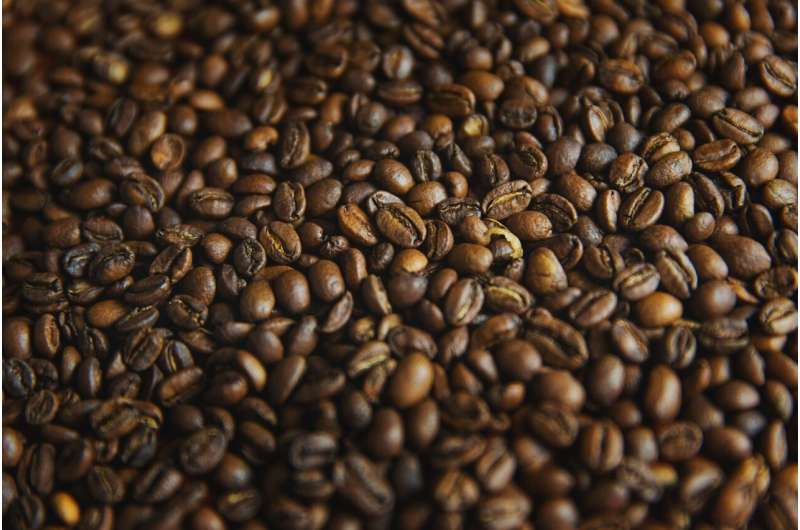This article has been reviewed according to Science X's editorial process and policies. Editors have highlighted the following attributes while ensuring the content's credibility:
fact-checked
peer-reviewed publication
trusted source
proofread
Have a second cup: Coffee provides health benefits, says study

Having that second cup may actually be good for coffee drinkers, according to a discussion of coffee's preventive and therapeutic benefits to human health in a recent review paper by Texas A&M University researchers.
The paper, "Health Benefits of Coffee Consumption for Cancer and Other Diseases and Mechanisms of Action," was published recently in the International Journal of Molecular Sciences.
Some of the coffee research reported in the review was conducted by Texas A&M AgriLife Research scientists in Texas A&M's College of Agriculture and Life Sciences Department of Nutrition and Department of Biochemistry and Biophysics in collaboration with researchers in the School of Veterinary Medicine and Biomedical Sciences Department of Veterinary Physiology and Pharmacology.
About coffee
Coffee is one of the most widely consumed beverages worldwide, and epidemiological studies have associated higher coffee consumption with decreased rates of mortality, as well as decreased rates of neurological and metabolic diseases, including Parkinson's disease and Type 2 diabetes.
"There is also evidence that higher coffee consumption is associated with lower rates of colon and rectal cancer, as well as breast, endometrial and other cancers, although there are conflicting reports on its benefit for some of these cancers," said Stephen Safe, Ph.D., a co-author of the review paper.
Safe is a Distinguished Professor and Regent's Professor of toxicology in the Department of Veterinary Physiology and Pharmacology. He has conducted research on the anti-inflammatory and anti-cancer properties in coffee.
Collaborative research
Among the studies noted in the review was an examination of the "Role of the aryl hydrocarbon receptor (AhR) in mediating the effects of coffee in the colon," originally published in Molecular Nutrition and Food Research. The research was conducted in the Safe Lab and Chapkin Lab, in collaboration with Arul Jayaraman, Ph.D., of the Texas A&M College of Engineering.
Chapkin and Laurie Davidson, Ph.D., a Department of Nutrition research scientist who works in the Chapkin Lab, were two of the primary contributors to the study.
"The mechanisms associated with the chemopreventive or chemotherapeutic effects of more than 1,000 individual compounds in roasted coffee are complex and may vary with different diseases," Chapkin said.
Some of these mechanisms may be related to pathways that target oxidative stress or pathways that induce reactive oxygen species to kill diseased cells, he said. There is also evidence for the involvement of receptors in addition to contributions from epigenetic pathways and the gut microbiome.
"As part of our study using genetically modified cell lines, mouse colonic organoids and transgenic mouse models, we wanted to further elucidate the mechanisms that would facilitate the potential future clinical applications of coffee extracts," Chapkin said.
The review noted that although roasted coffee beans and brewed coffee contain high levels of caffeine, there are several hundred individual phytochemical-derived compounds that include chlorogenic acid/lignans, alkaloids, polyphenolics, terpenoids, melanoidins, vitamins and metals. Some of these also include flavonoid quercetin, chlorogenic acid, caffeine, the alkaloid norharman also called beta-carboline, and the terpenoid cafestrol.
Coffee's mechanisms of action
Research showed the mechanisms of action of coffee are complex and dependent on the effects of its constituents, including chlorogenic acids, polyphenolics, terpenoids, alkaloids and other phytochemicals.
"We also found evidence that the antioxidant activity of coffee, which activates the nuclear factor erythroid 2-related factor 2, or Nrf2, may be an important mechanism of action," Davidson said. "But since Nrf2 exhibits both health-protective and drug-resistant activities, other cell context-dependent factors may also be important."
Davidson said they also found evidence that the protective effects of coffee in the gut decreased colon cancer risk, which may be due to its activity as an aryl hydrocarbon ligand. The aryl hydrocarbon receptor, AhR, is a transcription factor that regulates gene expression.
The collaborative study also demonstrated that roasted coffee-derived extracts function in part by activating the AhR. In the mouse model, coffee induced several AhR-dependent responses in the intestine. These included gene expression, inhibition of intestinal stem cell-enriched organoid growth and inhibition of intestinal barrier damage.
"Overall, these mechanisms, in concert with possible epigenetic pathways and the modulation of gut microbiota and microbial metabolites, contribute to the health benefits of higher coffee consumption," Chapkin said.
Their research also found that some coffee components bind the orphan nuclear receptor NR4A1 to the interactions with the AhR receptor. The NH4A1 receptor is a key factor in multiple diseases, such as arthritis, inflammation, cancer and cardiovascular diseases, and a high NR4A1 expression is associated with breast cancer.
The recently published paper also refers to research from the Safe Laboratory focused on developing and discovering compounds for mechanism-based drug development to target both cancer and non-cancer endpoints.
"A major target for cancer chemotherapy includes specific protein transcription factors, the aryl hydrocarbon receptor, the estrogen receptor and orphan nuclear receptors NR4A1," Safe said.
He said research from the Safe Lab has included collaboration with Chapkin and others to investigate the role of the aryl hydrocarbon ligand and its microbial metabolites on intestinal function and disease.
"We also have ongoing collaborations focused on endometriosis, Parkinson's Disease, and learning and memory," Safe said. "We have been very interested in the therapeutic impact of coffee consumption on many of these diseases and how it may improve human health."
While much of the research conducted on the human health benefits of coffee was performed using preclinical models, Safe and Chapkin said the mechanistic findings will support future translational studies in humans.
"This suggests that clinical applications of coffee extracts, particularly for treating some cancers, should be considered," Safe said.
More information: Stephen Safe et al, Health Benefits of Coffee Consumption for Cancer and Other Diseases and Mechanisms of Action, International Journal of Molecular Sciences (2023). DOI: 10.3390/ijms24032706





















